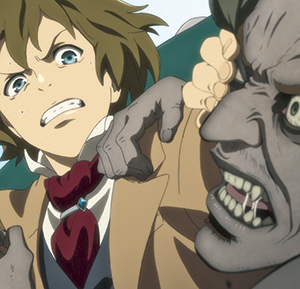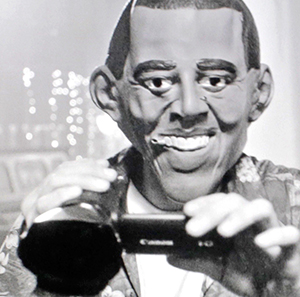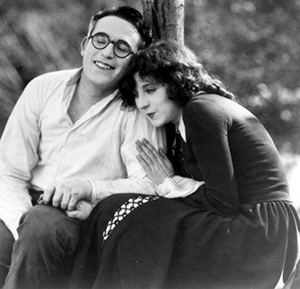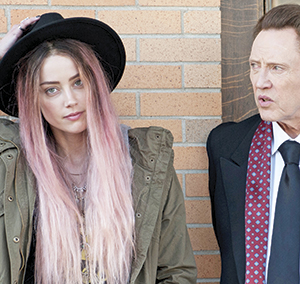James Franco | Festival Highlights | Rita Moreno | SJSU’s Kourosh Ahari


The Empire of Corpses
This (unfortunately) unpreviewed anime is tremendously ambitious—something like Alan Moore’s League of Extraordinary Gentlemen, only more so. In 1878, Sir Arthur Conan Doyle’s own Dr. John Watson and his zombie assistant, “Friday,” are recruited by the arch-intelligencer Mycroft Holmes to investigate a conspiracy that bids to shake the British Empire to its core. In this alternative history, in which Thomas Edison and Dr. Frankenstein exist side by side, Watson meets real-life adventurers—like Frederick Burnaby, a soldier as travelled and lucky as Col. Harry Flashman and far better behaved. He also encounters fictional creatures: Hadaly, the “Future Eve” of writer Auguste Villiers de l’Isle-Adam, the decadent novelist who coined the term “android.” It’s based on the novel by the ill-fated writer ‘Project Itoh’, who died of cancer before his 35th birthday. (Plays Mar 10 at 9:30PM, Mar 11 at 11:30 AM, and Mar 12 at 8:45 PM.) (RvB)
Chuck Norris vs. Communism
Interviews and re-enactments—shot in that cold, matter-of-fact style that defined Romanian New Wave—highlight Ilinca Calugareanu’s sentimental study of the effect bootleg VHS tapes had on Nicole Ceausescu’s tottering regime. In Communist Romania, there was one TV channel airing two hours of programming a night; when home video started sneaking in through the country’s western borders, it caused a sensation. Chuck Norris vs. Communism provides us with a way of thinking good thoughts about some of the most craptastic ’80s cinema; a scene of an upside-down Norris geeking a live rat in Missing in Action is remembered fondly as a blow for individualism by people who packed Bucharest living rooms to see it. Most charming here is the mystique that still enshrines one Irina Nistor. Ms. Nistor illegally dubbed some 3,000 videos into Romanian, and is remembered by aging fans as a kind of movie star in her own right. (Ms.Nistor seems to realize her status; she demonstrates polite aloofness in today’s interviews.) Teased at, but never really explored, is the question of how much the Communist regime really knew about the brisk trade in Hollywood movies. While the secret police raided living rooms to confiscate VHS players (as well they might, the machines were worth as much as an automobile), one wonders how much the authorities really cared about the illegalities. The film could have used some contextual words from, say, Slavoj Zizek about the difference between the permitted and the unpermitted-but-winked-at in a totalitarian society. (Hammer Theater, Mar 4, 5pm and Mar 8, 9:30; California Theatre, Mar 5, 11:15am) (RvB)
Ma Ma
If after watching Zoolander 2, you miss the Penelope Cruz from Pedro Almodovar’s marvelous Volver (2006), Ma Ma may just satisfy that longing. The director Julio Medem—probably best known in the States for Sex and Lucia (2001)—returns with the story of Magda, a woman who finds out she has breast cancer. This is the second film in which Cruz has played a woman with breast cancer. The first was in Isabel Coixet’s somber Elegy (2008), where she played a supporting role as Ben Kingsley’s lover. The Spanish film, however, situates Magda at the center of the story. While firmly in the melodrama category, Cruz grounds the film with her natural warmth, humor and unfailing appeal. (California Theatre, Sunday, March 6, 7pm) (JE)
The Adderall Diaries
James Franco is never not working. A quick scan of his IMDB page shows that 2016 will bring the release of fourteen film and television projects. This does not include three in various stages of production for 2017, and one more lined up for 2018. This begs the question: does Franco sleep? Regardless, in The Adderal Diaries he stars in this adaptation of the memoir by Stephen Elliott. On paper this sounds like a good match: Elliott founded the online literary magazine The Rumpus and has reserves of energy to write and direct films as well. The dark territory here is in their wheelhouse: addiction and the endemic unhappiness found in every damaged family. (California Theatre, Saturday, March 12, 7pm) (JE)
Demimonde
Attila Szasz’s Demimonde (the 19th century French term for prostitute) starts with the dead body of Elza (Patricia Kovacs) being found in a suitcase that has been fished out of the water. Where there’s a body there is a murderer and a motive. The film trips back four days prior to slowly reveal the possible motives the personages inhabiting this beautifully shot pre-WWI world of Hungary could have had for murdering Elza. However, it would be wrong to characterize this films as a whodunit. Elza is introduced (well, introduced as a living body) seated at her dining table in the company of three men, one of whom is a writer and her secret lover, and the other two from whom she hopes to secure the financing for a film she plans to star in (one in which she unblushingly wants to take on the role of Joan the Maid). Her gifts for inspiring lust and manipulation are laid bare and set the stage for a sticky and psychologically rich chamber drama between herself (a former prostitute and currently very well kept woman), her faithful housekeeper Rozsi (Dorka Gryllus), and the newly hired Botticelli angel-looking maid Kato (Laura Dobrosi). Szasz seems to derive inspiration from Alfred Hitchcock’s Rebecca. He takes what in Hitchcock were hushed suggestions of violence and Sapphic tension between the deceased Rebecca and Mrs. Danvers (her likewise crushingly devoted housekeeper) and makes them wholly overt in Demimonde to great dramatic effect. (VF)
Beginner’s Guide to Snuff
Director Mitchell Altieri and the North Bay’s Butcher Brothers (The Hamiltons, Cinequest ’06) collaborate on this violent yet amiable satire of the forbidden genre of snuff films. This urban legend was inflamed by a terrible recut grindhouse film titled Snuff (1976) which boasted it was shot “In South America…where life is CHEAP!” City living had gotten so ratty by the mid-1970s that people were willing to fall for the idea that actors were being killed on camera for our amusement. No such luck.) The slick Dresden (Richard Kern) and his gullible brother Domenic (Luke Edwards) are running out of money and hope in Los Angeles, and may have to go back to Minnesota. They hear of a horror movie contest and decide to trick some unfortunate actress into believing that she’s fallen into the hands of maniacs. “Don’t say anything about this being a snuff film,” Dresden advises. “We’re calling it an experimental film, at this point.” Jennifer (the terrific Bree Williamson) gets cast as the victim, and that was the two fools’ biggest mistake…soon, it’s a Ransom of Red Chief situation in which even the safe word (it’s “Mockingjay”) can’t save them. Male fantasy stuff at times, but the fiery-eyed Williamson is well worth watching and gorehounds will appreciate the witty procedural gags. (Mar 4, 9:45pm, Mar 6, 7pm at Hammer Theater; Mar 11, noon, Camera 12.) (RvB)
Embers
True to its title, Embers is perhaps the quietest post-apocalyptic tale to have made it onto a screen. In most post-apocalyptic films that chronicle society either rebuilding or further dismantling itself in the wake of the end of the world there is always a goal that the narrative is working towards—a plan, however far fetched, that brings hope for something better. But, Claire Carre’s haunting debut feature does not concern itself with what happens next. It is only interested in the now of existence and survival as its characters have an abortive relationship with time that makes it impossible for them to construct any sort of far-reaching plans. What little backstory there is we are able to slowly glean as the narrative deftly shifts between five different storylines. Embers presents a world nine years after the spread of a virus that has rendered the survivors unable to make any short term memories (though the range in extremity of this disease seems to have affected people differently, where some can hold onto memories for a day while others only for a few minutes). We are the sum of our experience on this planet and Embers boldly and intelligently takes on questions of identity, love and the meaning of existence without ever teetering over into what in the hands of a less capable filmmaker could be rendered maudlin. Despite the tangle of bleakness Carre still finds beauty in individual moments and a belief in the possibility of the ineffable strength of human connection that lies outside time, memory and consciousness. (VF)
Orleans
A strange man of dubious origin who calls himself The Executor (Viktor Sukhorukov) appears in a provincial Russian town, making its citizens come to a moral reckoning. Andrey Proshkin’s Orleans is a whimsical work of dark comedy that takes up what in recent years has become a popular theme of Russian art films: the moral and spiritual crisis of modern Russia (see also: the films of Andrey Zvyagintsev, Yury Bykov and Aleksei Balabanov, to name but a few). Orleans is a bold and by turns funny and grotesque work that examines the banality of everyday evil and moral muddiness. (VF)
February
Actor Osgood Perkins (most recognizable for his role as one of Elle Woods’ Harvard classmates in Legally Blonde) makes a stunning directorial debut with February. Winter, isolation, a rural boarding school, the devil, and adolescent women make for a potent combination in this horror film which stars Mad Men alum Kiernan Shipka and Emma Roberts. Kat (Shipka), along with another student Rose (Lucy Boynton), is forced to spend her winter break at the boarding school after her parents mysteriously fail to pick her up. At the same time, Joan (Roberts) makes her way across the country toward the school. As the plot screws tighten and the dread mounts the collision of these storylines becomes inevitable. (VF)
Girl Shy
The California Theatre is a venue worthy of hosting a screening of one of the great silent comedies of the 1920s. Girl Shy stars Harold Lloyd (a contemporary and equal of Buster Keaton and Charlie Chaplin) as a terribly shy young man who is simultaneously fascinated by and terrified of women. After a few false starts he falls in love with the girl of his dreams who is, as the logic of Hollywood scenarists necessitates, is set to marry another man. The last act finds Lloyd hurrying to stop the wedding in a stunning, frenzied chase sequence through crowded streets. Organist virtuoso Dennis James will be on-hand at the screening to accompany the film on the mighty Wurlitzer. (VF)
I Love You Both
A unique definition of an “it’s complicated”: Blonde, blasé Crystal (co-writer Kristin Archibald) and her gay piano teaching twin brother Donny (co-writer/director Doug Archibald) are in their twenties and still live together. That’s when the stable sibling relationship is troubled by the bisexual Andy (Lucas Neff) who isn’t clear on which twin he prefers. Doug Archibald’s film makes the unlikely situation plausible and diverting. I Love You Both doesn’t peter out into weird erotica or into soap. It’s fleshed by incidental details: the matter of fact observation of Crystal’s lassitude—she seems to be wearing pajamas for half the movie– and regular interjections from Crystal and Donny’s slightly gaga Midwestern mom. (Gifting her son with a thrift-shop bow tie, she says, “Put that tie on—it’ll show the universe you’re ready for success.”) It’s an example of the kind of romantic comedy we need, a comedy with more possibilities and less inevitabilities. (Mar 4, 7pm and Mar 8, 2:15pm Camera 12; Hammer, Mar 6, 9:15pm.) (RvB)
My Golden Days
Three Memories from my Youth is the literal and more accurate translation of Arnaud Desplechin’s latest film. Proust’s madeleine immediately comes to mind. As this is a French film, the dawning of sexuality and the loss of virginity are two of the movie’s main ingredients. Mathieu Amalric stars as Paul, the adult wistfully remembering his adolescent self. The flashbacks include a mother on the verge of a breakdown and a trip to the former USSR. This is Amalric’s third collaboration with Desplechin. In preparation you may want to watch A Christmas Tale from 2008, which masterfully showcases a dysfunctional family falling apart at the holidays. (California Theatre, Thursday, March 3, 7:30pm) (JE)
One More Time
In The Rum Diary (2011), Amber Heard played a bombshell of the 1940s film noir variety with the sultry combination of smolder and danger. Johnny Depp, her co-star at the time, must have thought so too; he married her last year. As Christopher Walken’s misfit daughter, Heard turns the heat down low and is unrecognizable as a confused and ordinary girl. If your on-screen father is Walken, the role must have held an inherent and obvious appeal: you know your character is going to arrive with some major baggage and kookiness. Set in the Hamptons, this East Coast film shares the loose feeling of a Henry Jaglom project where everyone seems like an odd but dear old friend. (California Theatre, Monday, March 7, 7:30pm) (JE)
The Phoenix Incident
While The Phoenix Incident is director Keith Arem’s feature film debut he has dozens of video game credits to his name (he is responsible for many of the Call of Duty installments), and thus brings a strong sense of world-building and sci-fi to The Phoenix Incident. The film details the true story of multiple missing persons cases that were reported in 1997 in Phoenix, Arizona following the unexplained appearance of strange lights in the sky. Found footage, UFOs, and the potential of government conspiracy are made use of in this genre cocktail of horror, sci-fi, and documentary. (VF)
Sunset Song
It is inarguably thrilling to exist in a world in which Terence Davies is making films (The Deep Blue Sea, The Long Day Closes, and Distant Voices, Still Lives are but a few of his masterpieces). Sunset Song (the title itself evocative of the sort of quiet and gorgeous filmmaking that Davies has hewed to throughout his career) is Davies’s adaption of Lewis Grassic Gibbon’s highly regarded 1932 novel. It is set on a farm in Scotland in the 1900s and follows heroine Chris Guthrie’s (Agyness Deyn) troubles with family and love. (VF)
Picks By: Richard von Busack, Jeffrey Edalatpour, Veronika Ferdman
James Franco | Festival Highlights | Rita Moreno | SJSU’s Kourosh Ahari






